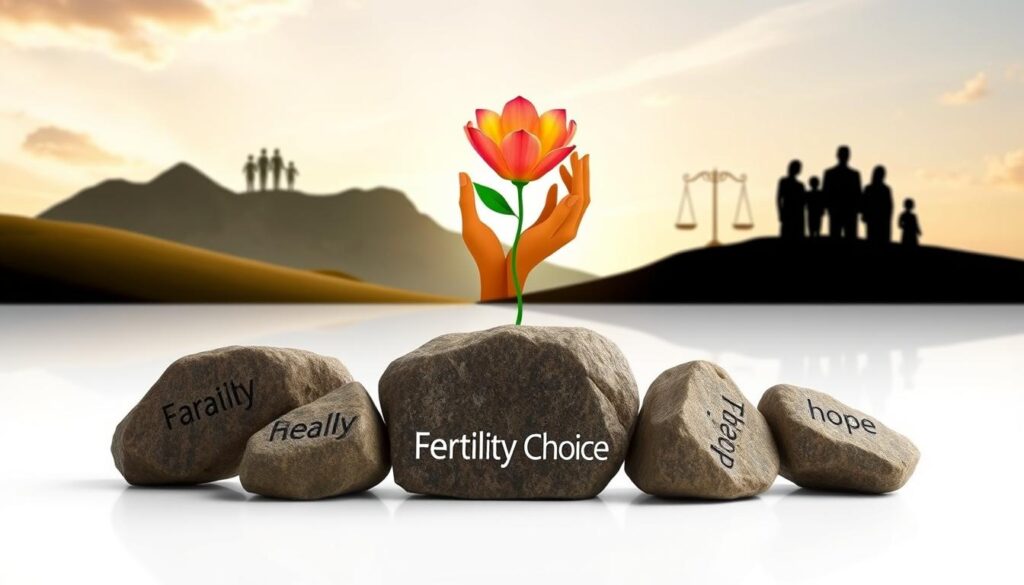
Surrogacy laws in South Africa are strict to protect everyone involved. This is stated in the Children’s Act 38 of 20051. The legal framework for surrogacy is clear, helping intended parents and surrogate mothers understand the process. Surrogacy is regulated by Chapter 19 of the Children’s Act, 38 of 20051, which outlines the surrogacy process in detail.
The laws in South Africa ensure fairness and protection for all. Chronic endometritis is a big problem for those trying to conceive, leading to failed pregnancies and implantation failures2. Women over 37 may find it harder to get pregnant, often after a year of trying naturally3.
Surrogacy is when a woman carries and gives birth to a child for someone else. This often happens because of infertility or medical issues4. In South Africa, it’s governed by Chapter 19 of the Children’s Act 38 of 20055. This law sets out the rules and rights for surrogate mothers.
Many families in South Africa have been created through surrogacy4. Surrogate mothers are usually between 21 and 40 years old4.
There are two main types of surrogacy: traditional and gestational. Traditional surrogacy uses the intended father’s sperm for artificial insemination. Gestational surrogacy involves carrying an embryo from IVF4.
The agreement must be approved by the High Court before starting any treatment4. The intended parents must also provide health and life insurance for the surrogate and the baby for three months after birth4.
The surrogate and the intended parents must live in South Africa when they sign the agreement5. The surrogate can only get compensation for her expenses, not for her time or effort5. Surrogacy in South Africa is only for altruistic reasons, meaning no payment is allowed except for expenses and lost earnings4.
It’s crucial to have clear surrogacy regulations and rights for surrogate mothers. These laws protect everyone involved in the process.
Surrogacy is a complex and emotional journey that needs careful thought and planning. It’s when a woman carries and gives birth to a child for someone else. The process includes understanding the laws, rights, and types of surrogacy available.
There are two main types of surrogacy: traditional and gestational. Here’s what each type involves:
| Type of Surrogacy | Description |
|---|---|
| Traditional Surrogacy | The surrogate mother is artificially inseminated with the intended father’s sperm. |
| Gestational Surrogacy | The surrogate mother carries an embryo created through in vitro fertilization (IVF)4. |
Surrogacy agreements are key in South Africa, outlining rights and duties for all involved6. They must be written and signed before starting the surrogacy journey. The High Court must also confirm the agreement to protect everyone’s rights6.
For a surrogacy agreement to be valid, all parties must live in South Africa when they sign6. A medical law or surrogate attorney must draw up the agreement. It must then be confirmed by the High Court6. These agreements are important because they give intended parents rights to the child from birth, stopping the surrogate from keeping the baby7.
Some important points about surrogacy agreements in South Africa include:
Having a detailed surrogacy agreement is crucial to protect the rights of both intended parents and surrogate mothers. This agreement should be well-written and confirmed by the High Court7. Knowing the rules and legal aspects of surrogacy agreements helps everyone involved feel more confident and clear about their journey6.
The surrogacy process has many steps, from finding a surrogate mother to the medical procedures. A surrogacy agency in South Africa can guide and support you through it8. They help find a surrogate who has at least one living child, a common requirement in 90% of cases8.
The medical steps include in vitro fertilization (IVF) and embryo transfer. The Children’s Act, Chapter 19, is the main law on surrogacy in South Africa since 20109. With a good surrogacy agency, the journey can be smooth and successful.
Intended parents need to think about the cost, which can be between R160,000 and R200,000. This covers legal, medical, and agency fees8. They also need to be emotionally ready for the journey. With the right support, the process can be rewarding for everyone.
In South Africa, surrogate mothers get paid for their expenses during the surrogacy. They also have the right to privacy and confidentiality10. This ensures they are treated with respect and care during the journey.
The rights of surrogate mothers are linked to those of intended parents. Both must work together for the child’s best interest11. Surrogate mothers have the right to make health decisions and be treated with dignity.
Some key aspects of surrogate mother rights in South Africa include:
Surrogate mothers are crucial in the surrogacy process. Their rights and well-being must be protected and respected10. By focusing on their rights, we make sure the process is fair and ethical for everyone involved, including intended parents11.
In South Africa, intended parents have the right to be legally recognized as the child’s parents. They also have the right to make decisions about the child’s care and well-being12. This is key to protecting the child’s best interests. It’s important to know the rights and duties of everyone involved in surrogacy agreements.
The laws in South Africa, the National Health Act 61 of 2003 and the Children’s Act 38 of 2005, guide surrogacy agreements12. These laws ensure that the child’s needs come first. For example, the Children’s Act says the child’s best interests are always first, and they have the right to a name and nationality from birth12.
Some important rights for intended parents include:
It’s important that surrogacy agreements are not for profit12. The South African Law Commission (SALC) has looked into making laws clearer for surrogacy13.
In summary, intended parent rights are vital in South Africa’s surrogacy process. Knowing these rights and the laws helps ensure the child’s best interests are always first12.
| Aspect of Intended Parent Rights | Description |
|---|---|
| Recognition as legal parents | The right to be recognized as the legal parents of the child born through surrogacy |
| Decision-making regarding the child’s care and well-being | The right to make decisions regarding the child’s care and well-being |
| Access to information about the child’s genetic origins | The right to access information about the child’s genetic origins |
Surrogacy in South Africa is governed by the Children’s Act 38 of 2005. This act outlines the rules for surrogacy agreements and the rights of everyone involved14. It says that for a surrogacy agreement to be valid, it must be approved by the High Court11.
The court must think about what is best for the child when considering surrogacy11.
The laws in South Africa aim to protect everyone’s rights and well-being in surrogacy14. They require written agreements signed by all parties. Also, at least one of the commissioning parents must live in South Africa14.
The surrogate mother must have had a child before and must not seek money for her role14.
Surrogacy regulations are very important. They ensure the process is safe and ethical15. They also protect everyone’s rights and prevent exploitation11.
By following these regulations, people can make sure they are doing the right thing. They are protecting the child’s best interests14.

A surrogacy agency in South Africa is key in the surrogacy process. They help find a surrogate mother and offer support and guidance14. The agency ensures all legal and medical steps are followed. This includes following the Children’s Act 38 of 200514.
Both intended parents and surrogate mothers benefit from working with an agency. The agency guides them through the surrogacy process16. They also help with communication between the parties, making the journey smoother.
Working with a surrogacy agency in South Africa offers many advantages:
By choosing a reputable surrogacy agency in South Africa, everyone involved can have a stress-free experience14. The agency provides essential support and guidance, making the journey successful.
| Surrogacy Agency Services | Benefits |
|---|---|
| Matching with a surrogate mother | Increased chances of a successful surrogacy journey |
| Support and counseling | Emotional support and guidance throughout the journey |
| Navigation of legal and medical requirements | Ensured compliance with all regulations and laws |
The Children’s Act 38 of 2005 governs surrogacy laws in South Africa. It sets out the rules for surrogacy agreements and the rights of everyone involved14. The legal process for surrogacy is detailed and must consider the rights of the surrogate, the intended parents, and the child16.
Important points in South Africa’s surrogacy laws include written agreements needing High Court confirmation14. The surrogate mother must give her consent, and the intended parents must pass medical and psychological checks16.
The laws also protect the surrogate mother’s rights, like the right to end the agreement within 60 days if she’s the genetic mother14. The intended parents can apply for a court order to confirm the agreement and gain parental rights16.
In summary, South Africa’s surrogacy laws protect everyone’s rights14. It’s crucial for all parties to know these laws and follow them for a successful surrogacy16.
Surrogacy brings up many ethical questions. These include the rights of surrogate mothers and the happiness of the child born through it17. In South Africa, only altruistic surrogacy is allowed, meaning no money can change hands17. The laws here focus on keeping surrogate mothers’ rights safe and making sure the process is open and fair18.
Dealing with surrogacy’s ethics is very complex. There are worries about using surrogate mothers unfairly, the rights of the child, and the role of agencies18. To tackle these issues, clear rules and guidelines are needed. These should put the well-being and rights of everyone involved first17.
Some important ethical points in surrogacy are:
The aim of surrogacy laws should be to make the process fair, open, and respectful of everyone’s rights and dignity18. By focusing on the well-being and rights of surrogate mothers, children, and intended parents, we can build a more ethical and caring surrogacy industry17.

Surrogacy affects families and society deeply. In South Africa, surrogacy laws are set out in Chapter 19 of the Children’s Act 38 of 200519. The surrogacy process can change families a lot. It’s key to think about these changes before choosing surrogacy.
Children’s rights are mentioned in global documents like the UNCRC and ACRWC19. In South Africa, Chapter 19 of the Children’s Act No. 32 of 2005 outlines surrogacy rules20. This ensures the rights of children and all parties involved are clear.
Important things to know about the surrogacy process include:
It’s crucial that surrogacy laws in South Africa are fair and clear. This protects the rights of everyone involved19. By understanding surrogacy’s social effects and the surrogacy process, we can build a more welcoming society for all families.
In conclusion, South Africa’s surrogacy laws have been in place for over two years21. The Children’s Act 38 of 2005 aims to regulate this complex area. Yet, only two cases have been reported since the law started21.
These cases dealt with the pre-authorization process for surrogate agreements. No court disputes have been settled about ending a surrogate motherhood agreement21.
The Act requires a court-approved agreement before fertilizing the surrogate mother. Legal parenthood goes to the commissioning parents when the child is born22. But, commercial surrogacy is still banned in South Africa21.
This law comes from a fear of surrogacy becoming more common. It was prompted by the South African Law Commission’s investigation21.
Surrogacy is becoming more popular worldwide, due to infertility and fewer adoptable children. South Africa needs better and more flexible surrogacy laws21.
The current model is a good start but might need updates to handle new challenges and issues232122.
Stay Connected and Get Personalized Assistance
Thank you for reading! We hope you found this post helpful and informative. If you have any questions or need further assistance, please reach out. We’re here to help you on your journey
